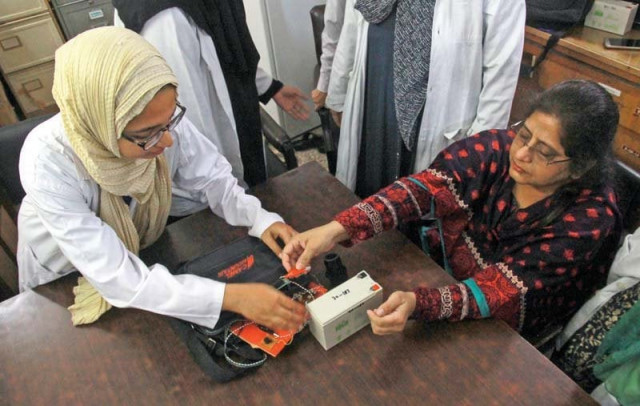KU students develop heart attack detection device
It can record, detect abnormal signals and send alerts to concerned people

A team of researchers displays the heart attack detection device at Karachi University. PHOTO: ATHAR KHAN/ EXPRESS
According to the eight-member team of inventors – all PhD interns – the system has been developed for the first time in Pakistan. The device is in its initial stage and consists of a smart kit including a circuit that will continuously monitor the heart rate of users and display it on the screen.
Exhibiting talent: 73 students of KU put up impressive annual degree show
“Some 111,367 deaths which make up 9.87 per cent of the total deaths in Pakistan are caused by cardiovascular diseases (CVD),” said KU’s International Centre for Chemical and Biological Sciences (ICCBS) director Professor Dr Muhammad Iqbal Choudhary, citing World Health Organisation data published in May 2014.
He said the CVD patients require urgent medical treatment when they experience severe or mild cardiac arrests. The electrocardiogram (ECG) is a conventional technique used to detect heart attacks and for this procedure, the patient needs to reach the hospital urgently.
“The delay in the start of the treatment can aggravate the condition of the patient, who requires urgent medical treatment. This situation demands development of a quick and urgent detecting system for heart attacks,” he added.
The device can record both the temperature and heart rate of a person; can detect the abnormal signals and send it to the concerned people – including family members, ambulance service and physician while using GSM service, claimed the research team.
According to the innovators, the device can further include parameters of blood pressure and can send out an alarm if it goes near the danger zone after crossing the prescribed limit of heart beats.
According to Aisha Aziz – a PhD student of pharmacology – in a majority of cases, patients ignore the initial symptoms of a heart attack; regard them as stomach burning and rely on self-medication. “If in such cases, the patient visits the physician or takes the prescribed medicine on time then his life can be saved before the symptoms aggravate,” she added.
Saba Majeed, one of the developers, was of the view that such devices if made locally can revolutionise biomedicine and help the emerging researchers achieve something extraordinary in the field of innovation.
Talking to The Express Tribune at the research centre, another team member Mehwish Subhan said the device offered something new as it can send text messages to the concerned people and can also send beepers to the wearer as well. The device has also won first prize at the distinguished Innovations, Collaboration and Entrepreneurship event held in Islamabad last month.
Evening programme: Admissions open at KU
“The cost of the device is currently Rs30,000 which can be reduced by making it compact with a better design,” said Maha Shahid, another team member. “Extensive research is needed to make it more advanced, compact and commercially viable.”
The students’ supervisor Dr Shabana Simjee said she was of the view that the students need to pass the device through the standardisation process so that the problems encountered can be trouble-shooted in the interest of patients.
Published in The Express Tribune, January 5th, 2017.



















COMMENTS
Comments are moderated and generally will be posted if they are on-topic and not abusive.
For more information, please see our Comments FAQ